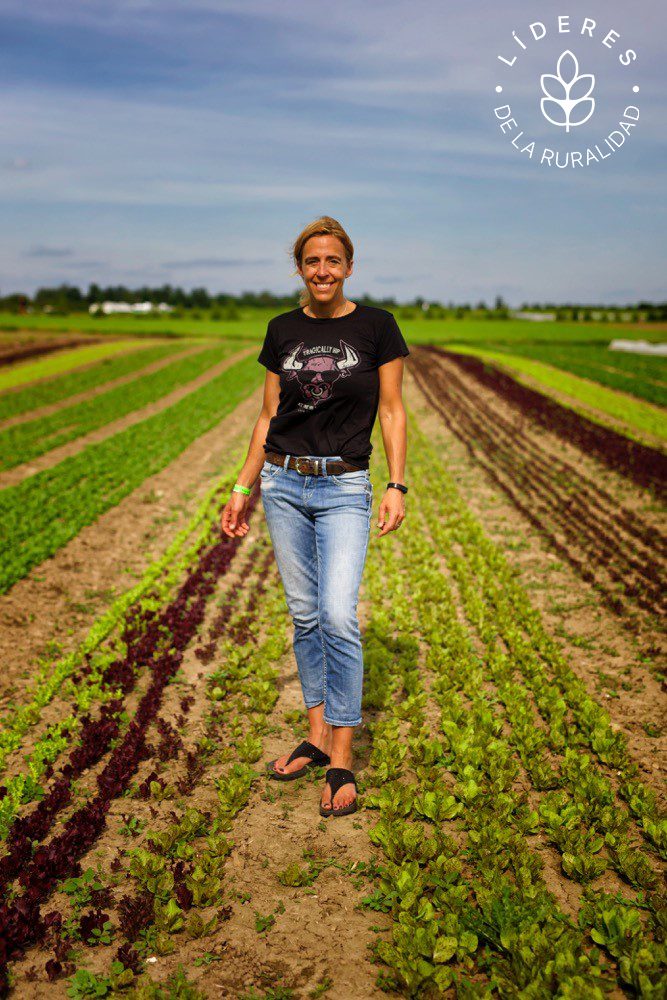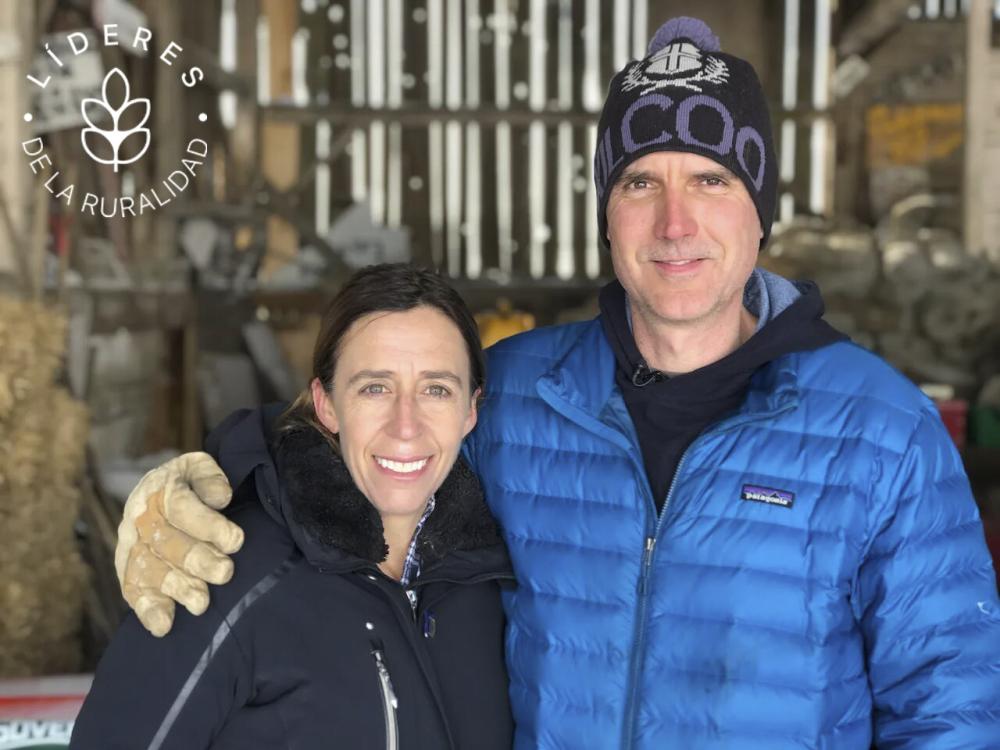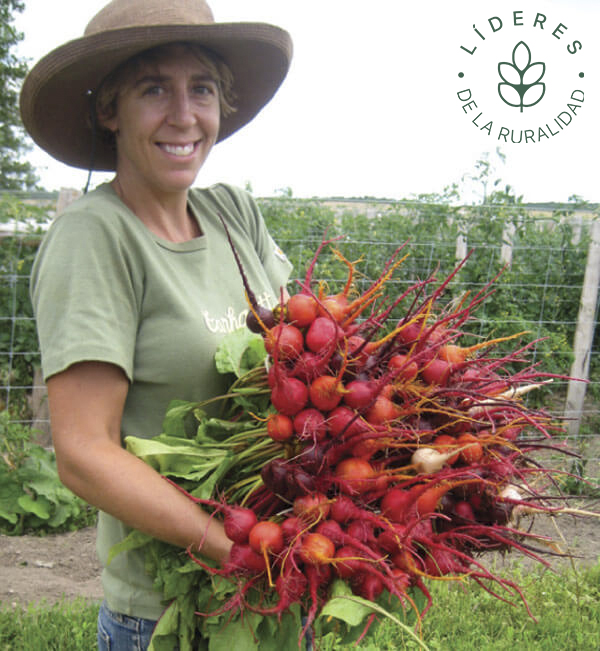Flies vivía en la ciudad de Toronto con su esposo, Brent Preston, y sus dos pequeños hijos, cuando decidieron mudarse al campo para instalar una granja en la que cultivarían la clase de alimentos sanos que querían darles a sus hijos y que al mismo tiempo hiciera una contribución al cuidado del ambiente.

San José, 2 de mayo de 2022 (IICA) – Gillian Flies, quien practica la agricultura regenerativa en su granja en la provincia canadiense de Ontario y propicia el acceso de todos los consumidores a alimentos orgánicos, fue reconocida como una de las “Líderes de la Ruralidad de las Américas” por el Instituto Interamericano de Cooperación para la Agricultura (IICA).
El premio, denominado “Alma de la Ruralidad”, es parte de una iniciativa del organismo especializado en desarrollo agropecuario y rural para reconocer a hombres y mujeres que dejan huella y hacen la diferencia en el campo del continente americano, clave para la seguridad alimentaria y nutricional y la sostenibilidad ambiental del planeta.
Flies vivía en la ciudad de Toronto con su esposo, Brent Preston, y sus dos pequeños hijos, cuando decidieron mudarse al campo para instalar una granja en la que cultivarían la clase de alimentos sanos que querían darles a sus hijos y que al mismo tiempo hiciera una contribución al cuidado del ambiente.
Así, crearon La Granja Nueva (The New Farm), en la que producen alimentos orgánicos por medio de agricultura regenerativa, a la que ella define como un tipo de agricultura que deja el suelo y el ambiente en general en mejores condiciones de las que lo encontró. En su establecimiento, entrenan agricultores jóvenes interesados en aprender buenas prácticas.
Hoy Gillian Flies es la presidenta de la asociación de Productores Orgánicos Canadienses, mientras que su esposo Brent Preston es el presidente de la Asociación de Agricultores Ecológicos de Ontario.
El Premio Líderes de la Ruralidad es un reconocimiento para quienes cumplen un doble papel irremplazable: ser garantes de la seguridad alimentaria y nutricional y al mismo tiempo guardianes de la biodiversidad del planeta a través de la producción en cualquier circunstancia. El reconocimiento, además, tiene la función de destacar la capacidad de impulsar ejemplos positivos para las zonas rurales de la región.
Gillian Flies, la profesional que abrazó la agricultura para hacer del planeta un lugar mejor
Gillian Flies y su esposo, Brent Preston, vivían con sus dos pequeños hijos en un departamento de dos habitaciones de Toronto, la ciudad más poblada y el mayor centro financiero de Canadá.
Tenían buenos trabajos, ella como consultora de organizaciones y él, como productor de TV, y vivían con comodidad. Sin embargo, cuando miraban a su alrededor veían una cantidad de situaciones que los preocupaban: calentamiento global, cambio climático, un número creciente de personas con problemas de salud, cada vez más obesidad.
“En un determinado momento nos dimos cuenta de que todas esas cosas se relacionaban directamente con la forma en que producimos nuestros alimentos. Entonces, hace unos 15 años, decidimos mudarnos al campo y empezar a desarrollar una granja orgánica para ocuparnos de estas cuestiones, pero también para demostrar que es posible hacer agricultura de otra manera. Queríamos cultivar la clase de alimentos que deseábamos darles a nuestros hijos y, al mismo tiempo, contribuir a hacer del mundo un lugar mejor, porque entendimos que esperar que las soluciones las aportaran otras personas no era una opción”, cuenta Gillian.

Gillian y Brent cambiaron entonces de vida e instalaron “La Granja Nueva” (The New Farm) en Creemore, una localidad de la provincia de Ontario, ubicada una hora y media al norte de Toronto. Ninguno de los dos contaba con conocimientos técnicos sobre la actividad agropecuaria, a pesar de que Gillian tenía la experiencia de haber crecido en Vermont, en la costa este de los Estados Unidos, en un campo de ovejas que era el pasatiempo de su padre.
A partir de ese momento aprendieron su nuevo trabajo gracias a las enseñanzas de otros agricultores, a lo que encontraron en libros y en internet y a los importantes aportes de organizaciones de productores. Así, en medio de errores y desaciertos, fueron superando las frustraciones del inicio y construyendo un camino para la producción de alimentos sanos que al mismo tiempo hiciera una contribución al bienestar de su comunidad y a la mejora del ambiente.
“Cuando empezamos a producir alimentos -recuerda Gillian- lo primero que notamos es que había una barrera de accesibilidad para los alimentos saludables, aquellos que se producen de una forma que no se externalizan ninguno de los costos ambientales de la actividad agropecuaria. Ese tipo de productos, en el supermercado, salen más caros que los alimentos tradicionales”.
Entonces, Gillian y Brent lanzaron un programa llamado “Granjas para el Cambio” (Farms for Change).
“Lo que hacemos es recolectar dinero a través de grandes donantes y de miembros de nuestra comunidad, que es muy generosa, y con él producimos y enviamos alimentos saludables a organizaciones dedicadas a la alimentación en Toronto y otros lugares de la provincia de Ontario. Hasta hoy hemos juntado casi dos millones de dólares para este programa y hemos enviado miles y miles de libras de productos orgánicos a 15 organizaciones sociales”, cuenta ella.
El descubrimiento de la agricultura regenerativa
Después de unos cuantos años trabajando en su granja orgánica, Gillian y Brent llegaron a la conclusión de que no estaban conformes con algunas de las prácticas que realizaban, como la labranza permanente, porque no eran buenas para el cuidado de la salud de los suelos y del ambiente en general.
“Aunque la orgánica es, por mucha distancia, la forma de agricultura más beneficiosa para el ambiente, también genera problemas. Luego del Acuerdo de París sobre cambio climático, que se firmó en 2015, empezamos a escuchar sobre la agricultura orgánica regenerativa y cómo puede contribuir a que los suelos secuestren carbono. Cuando empezamos a investigar en profundidad sobre las prácticas regenerativas, nos sorprendimos con su potencial”, dice Flies.

“El carbono es necesario para la vida -agrega- pero el problema es cómo está distribuido. Debido a las prácticas productivas que se extendieron en las últimas décadas, hay demasiado carbono en la atmósfera y es insuficiente en el suelo. Así que hoy en nuestra granja nos concentramos en secuestrar más carbono del que emitimos y en no colocar en el suelo agroquímicos ni nada que mate la vida. Nunca dejamos al suelo descubierto. Así, nos convertimos en una granja de entrenamiento a la que vienen a aprender agricultura regenerativa muchos agricultores jóvenes”.
Gillian Flies es actualmente la presidenta de la asociación de Productores Orgánicos Canadienses, mientras que su esposo Brent Preston es el presidente de la Asociación de Agricultores Ecológicos de Ontario.
“La agricultura regenerativa -define ella- es una forma de producir alimentos que deja al suelo más saludable de lo que estaba y mejora la situación ambiental en general, ya que secuestra carbono y reduce las emisiones de gases de efecto invernadero. Las prácticas de la agricultura regenerativa incluyen la reducción o eliminación de la labranza, el uso de cultivos de cobertura en lugar de fertilizantes nitrogenados y el no empleo de pesticidas, herbicidas y funguicidas. Es un método que realmente beneficia a la biodiversidad, porque incluye la plantación de árboles y la integración de los animales al ambiente”.
La Granja Nueva de Creemore, Ontario, se convirtió así en la primera granja de Canadá certificada en agricultura orgánica regenerativa y sus dueños se sorprendieron no solo por los beneficios ambientales sino también en términos de rentabilidad. Tanto, que hoy impulsan la transición de unidades productivas de otros lugares del país a ese mismo método, de manera que sean más resilientes.
“A través de las organizaciones con las que trabajamos mi esposo y yo, se ha construido una coalición de 24 entidades que representan más de 20.000 agricultores, llamada Agricultores para Soluciones Climáticas (Farmers for Climate Solutions) y estamos jugando un rol importante en el llamado a una agricultura amigable con las políticas contra el cambio climático y lo más estimulante es que el gobierno de Canadá nos está escuchando y está empezando a dedicar dinero a la implementación de estas prácticas”, se entusiasma ella.
Gillian está preocupada por la necesidad de atraer jóvenes a la agricultura y, en ese sentido, sostiene que lo primero es garantizar la rentabilidad de la actividad: “En Canadá, igual que en otros países, los agricultores no están ganando lo suficiente y la mayoría de los productores tienen un segundo trabajo para completar sus ingresos. Las grandes empresas están comprando cada vez más tierras para formar enormes conglomerados y a los pequeños productores les es cada vez más difícil competir. Sin embargo, hay mucho espacio para que los gobiernos incentiven a los jóvenes, a través del pago de los servicios ecosistémicos que puede brindar la agricultura. También hace falta más ayuda estatal a los agricultores familiares que producen los alimentos que consumimos todos los días. No todo debe ser commodities agrícolas”.
“Los agricultores -concluye- estamos en la primera línea del combate contra el cambio climático. No tenemos mucho tiempo y necesitamos una revolución en la forma en que cultivamos nuestros alimentos. Los gobiernos y los consumidores tienen que estar al tanto del papel de la agricultura regenerativa y deben apoyarlos. Los agricultores debemos producir alimentos en medio de un caos climático y eso es difícil, pero también tenemos una enorme oportunidad para ser parte de la solución al calentamiento global. Y esa es nuestra responsabilidad”.
Más información:
Gerencia de Comunicación Institucional
comunicacion.institucional@iica.int










